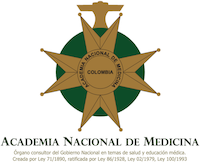Comparación de índices pronósticos de morbimortalidad en pacientes neurológicos.
Palabras clave:
neurología, neurocirugía, cuidados intensivos, morbimortalidad, APACHE II-TISSGLASGOWResumen
Escala de MBC, Apache 11,Glasgow, TISS. El objetivo de este trabajo es comparar en los pacientes neurológicos las calificaciones de la escala de monitoreo básico cerebral (MBC) con las calificaciones de los índices pronósticos de severidad ya establecidos en las unidades de cuidados intensivos, índices predictivos de morbimortalidad como, Glasgow, Apache 11,y TISS. De un total de 413 pacientes que ingresaron a la Unidad de Cuidados intensivos en el año 2001,91 pacientes (22%) fueron por causa neurológica, con edades comprendidas entre 51 ± 20.1 años, discriminados en 42 hombres y 49 mujeres, y con una estancia promedio en la unidad de cuidados intensivos de 3 ± 2 días. A estos pacientes se les calificaron los índices predictivos de morbimortalidad (APACHE II-TISSGLASGOW) y se compararon sus calificaciones tanto de vivos como de fallecidos con la escala MBC. Los valores obtenidos al calificar a los pacientes con la escala de monitoreo básico cerebral (MBC), APACHE 11,Glasgow, al ingreso (tiempo 1) fue significativamente diferente entre vivos y fallecidos (p 001); la evaluación al momento de su mejor evolución (tiempo 2) y al egreso (tiempo 3) entre vivos y fallecidos también se encontraron diferencias significativas con una (p < 001). En el grupo de pacientes que fallecieron no hubo cambios significativos en las escalas de MBC, APACHE 11,GLASGOW, en sus tiempos 1, 2 Y 3, con una (p < 0.5). En 63 pacientes que tuvieron una calificación de MBC entre 0-10 puntos la mortalidad fue del 9.5%. En 28 pacientes que tuvieron una calificación de MBC entre 11-20 puntos la mortalidad fue de 57% La escala de MBC es un índice pronostico de mortalidad en el paciente neurológico que dará una apreciación más objetiva y dinámica en el manejo del paciente en fase aguda y, traduce el estado de conciencia calificado mediante la escala de Glasgow. ABSTRACT The aim of this work is to compare grades in the basic cerebral monitoring (BCM) scale in neurological patients with grades in the prognostic rates of severity previously established in intensive care units using the Glasgow, Apache 11and TISS scales. 413 patients were admitted to the ICU in 2001, of whom 91 (23%) were admitted for neurological problem; their ages were between 51 ± 20.1 and stayed there from 3 ± 2 days on average. The Apache 11,TISS and Glasgow morbimortality scales were applied to these patients and later compared with the BCM (basic cerebral monitoring scale) in living and deceased patients. After being admitted to the intensive care unit the patients were graded (time 1), with the BCM, Apache 11and Glasgow scales and the grades obtained were significantly different in living and deceased patients (p < 001). The evaluation at the moment of their peak of recovery (time 2) and their release (time 3) between living and deceased patients also showed a significant difference regarding a (p< 001). There were no significant changes in the BCM, Apache II and Glasgow scales in the group of deceased patients, in their times 1, 2 and 3 in relation to a (p< 05). The mortality rate in 63 patients obtaining a BCM evaluation on a scale of O to ten, was 9,5%. and the mortality rate in 28 patients with a BCM evaluation on a scale of 11 to 20, was 57%. The BCM scale, which is a prognostic mortality rate for a neurological patient, will give a more dynamic and objective appraisal for the manipulation of a patient in an acute phase and also provides a state of consciousness graded through the Glasgow scale.Biografía del autor/a
Rubén D. Camargo, Clínica General del Norte
Referencias bibliográficas
Rubén D. Camargo. Escala de monitoreo Básico Cerebral en el paciente Neurológico 1997. Tercer premio Trabajos libres Primer Congreso Colombiano de Medicina Critica y Cuidados Intensivos.
www.arrakis.es
www.vghtpe.gov.tw/-icuITlSS.htm
Knaus W. Apache - Acute physiology and chronic health evaluation a physiologically based classification system. Crit. Care Med. 1981;9:591.
Greenspan. Col. Abbreviated injury scale and injury severity score a scoring charlo J. Trauma 1985; 25:60-527.
Marion, D. W, y Carlier, PM. " Problems with initial Glasgow Coma Scale assessment caused by prehospital treatment of patients with head injuries: Results of a national survery", J Trauma, 1994, 36:89-95.
Critical care medicine 1986 by the William R. Kanaus Pág 818.
Critical Care Medicine 1984, 12:155.
Cómo citar
Descargas
Descargas
Publicado
Número
Sección
Licencia
Copyright
ANM de Colombia
Los autores deben declarar revisión, validación y aprobación para publicación del manuscrito, además de la cesión de los derechos patrimoniales de publicación, mediante un documento que debe ser enviado antes de la aparición del escrito. Puede solicitar el formato a través del correo revistamedicina@anmdecolombia.org.co o descargarlo directamente Documento Garantías y cesión de derechos.docx
Copyright
ANM de Colombia
Authors must state that they reviewed, validated and approved the manuscript's publication. Moreover, they must sign a model release that should be sent.
| Estadísticas de artículo | |
|---|---|
| Vistas de resúmenes | |
| Vistas de PDF | |
| Descargas de PDF | |
| Vistas de HTML | |
| Otras vistas | |



